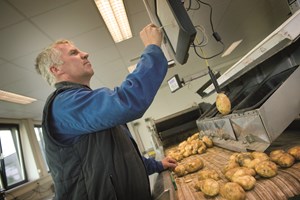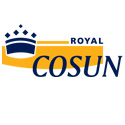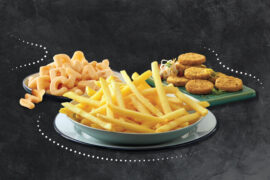Breda, Holland-headquartered Royal Cosun, a major processor of sugar beets and parent company of value-added potato manufacturer Aviko, has reported results for 2014. Consolidated turnover declined slightly to €2.1 billion (2013: €2.2 billion), while operating profit dropped to €110 million (2013: €172 million). Net profit is projected at €79 million, compared with €139 million the year before.
 Steenderen-based Aviko BV, which ranks as the world’s fourth biggest packer of frozen potato products and largest supplier of chilled french fries, realized a good result thanks to increased sales, better capacity utilization in its factories and higher margins with lower costs for raw materials. In addition, its specialties share increased again. Aviko acquired a majority interest in the Amberger specialty potato operation in southern Germany last year, and in a french fry plant in northeastern China.
Steenderen-based Aviko BV, which ranks as the world’s fourth biggest packer of frozen potato products and largest supplier of chilled french fries, realized a good result thanks to increased sales, better capacity utilization in its factories and higher margins with lower costs for raw materials. In addition, its specialties share increased again. Aviko acquired a majority interest in the Amberger specialty potato operation in southern Germany last year, and in a french fry plant in northeastern China.
Rixona (granulate and flakes) performed well in 2014. On balance the Aviko group strongly improved its result compared to 2013.
Sugar is by far Royal Cosun’s main business. The agri-industrial conglomerate was established more than a 110 years ago by Dutch sugar beet growers. Today, the cooperative has some 9,400 member/shareholders, and has grown into a business with 3,500 employees.
Despite the significantly lower in prices, 2014 was nonetheless described as a good year for its Suiker Unie unit. Large quantities were sold in 2013, when the sales prices were higher. In the course of the financial year prices dropped to a very low level. In 2015 this will result in a further decline of the result in sugar.
According to Suiker Unie, 2014 was a historically good year for both the cultivation and processing of beets. The average sugar yield per hectare exceeded 15 tons. Dutch sugar factories, which reportedly never processed so much volume, operated well during the entire campaign.
Inulin manufacturer Sensus recorded a higher turnover in 2014, and continues to grow faster than the market. Higher costs for raw materials did put pressure on the result, however.
SVZ showed comparable results as those in 2013. Sales increased slightly while turnover decreased somewhat. Due to shifts in the product mix (relatively more vegetables and less red fruit) the stability of the result improved. Vegetable juices are on the way up as well as the demand for natural coloring agents.
The Duynie group did well in fodder despite declining prices in 2014. Ample supply was available, as a result of which sales prices came under pressure. The integration of two acquisitions (in 2013 and 2014) was completed successfully. Starch processor Novidon did, however, have a difficult year due to competition, mostly by wheat starch.
Robert Smith, president and chief executive officer, commented: “We anticipated the increasing price fluctuations, mostly in sugar, and they will put pressure on our result in 2015. These developments confirm our strategy of wanting to grow in order to strengthen our profitable activities, also in sugar. We therefore continue our investments unabatedly.”
 Cosun aims to keep expanding its existing business and grow in new areas where vegetable raw materials can be further capitalized. An example is the production of green gas in biomass fermenters at three sugar factories. The activities of Cosun Biobased Products specifically focus on the development of new products and applications. For instance, the inulin derivative CMI for detergents, and microfibers from beet pulp for use in coatings.
Cosun aims to keep expanding its existing business and grow in new areas where vegetable raw materials can be further capitalized. An example is the production of green gas in biomass fermenters at three sugar factories. The activities of Cosun Biobased Products specifically focus on the development of new products and applications. For instance, the inulin derivative CMI for detergents, and microfibers from beet pulp for use in coatings.
2014 Beet Price
The beet price consists of a minimum EU price, the members’ bonus, and the sugar content and other payments. The price for quota beet supplied during the 2014 campaign was €50.18 per ton (2013: €67.26), at an average extractability and an average sugar content.
The early sowing date and favorable weather conditions contributed to the high average sugar yield per hectare. For the first time ever the threshold of 15 tons of sugar per hectare was exceeded. The excellent campaign, during which 6.6 million tons of beet were processed at the Dinteloord and Vierverlaten factories within 135 days, also contributed to this. Despite the lower beet price, the average financial yield per hectare in 2014 thus arrived at a good end result for the grower: €4,354 vs. €4,917 in 2013.
The following table shows the Dutch beet harvest and beet sugar production for 2014 compared to that of 2013 (in brackets):
| Processed Beet | [in tons] | 6,866,000 | (5,734,000) |
| Sugar Content Beet | [in %] | 16.7 | (16.9) |
| Extractability | [index] | 91.2 | (91.1) |
| Total Sugar Production | [in tons] | 1,125,000 | (948,000) |
Due to the extensive beet harvest and high sugar production, approximately 170,000 tons of sugar was passed on, of which the first quota sugar of the next campaign has already been produced.





